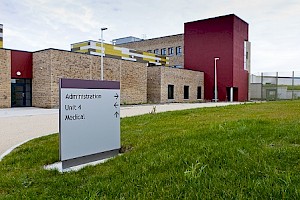Youth Justice
Ireland has a long history of poor responses to offending behaviour by children. A core strand to IPRT's work since its establishment in 1994 has been the promotion of a more effective youth justice system, with emphasis on non-custodial alternatives, diversion, early intervention and prevention strategies and programmes. Central to our work was ending the practice of detaining children in adult prisons, which was in breach of international human rights standards and a serious stain on Ireland's human rights record.
International human rights standards, and in particular the provisions of the UN Convention on the Rights of the Child, are clear that custody for children should only be used as a last resort and for the minimum required period of time. All efforts should be made to apply alternatives to detention to ensure that such a measure is only used in exceptional circumstances.
In Ireland, the Children Act 2001 recognizes the principle of detention as a last resort. The Act prohibits the imprisonment of children and the Criminal Justice Act 2006 makes provision for all children less than 18 years of age to be detained in Children Detention Schools. The detention school model is focused on a model of care, education, health and programmes that address offending, with improved outcomes for the young people, their communities and all of society. The Irish Youth Justice Service is responsible for the Children Detention Schools, within the Department of Children and Youth Affairs.
Following years of sustained advocacy by IPRT, along with many national and international bodies, in 2012 the detention of boys aged under 17 at St Patrick's Institution ended. In March 2017, a Ministerial Order ended the sentencing of children aged under 18 to adult prison in Ireland, and in April 2017, St. Patrick’s Institution was finally closed. Since September 2017 boys aged under 18 are no longer detained in the adult prison system.
IPRT continues to work towards progressive change in youth justice policies and practice, as well as engaging with wider policy and practice issues relating to youth justice, such as the provision of alternatives to detention, diversion and early intervention programmes.

NI: Inspection report on Juvenile Justice Centre
20th June 2018
The Criminal Justice Inspection Northern Ireland (CJI) has published an inspection report on the Woodlands Juvenile Justice Centre (JJC).
Oberstown Children Detention Campus: Key characteristics of young people in detention for Q1 2018
18th June 2018
Data shows a high number of young people held on remand and a high prevalence of mental health problems.
Call For Submissions: Addressing the Over-Representation of Children in Care in the Criminal Justice System
16th March 2018
The Irish Penal Reform Trust has commissioned research on the over-representation of children in care or with care experience in the criminal justice system.
2016 Report on the Garda Diversion Programme
20th February 2018
The Department of Justice and Equality has published the 'Annual Report of the Committee Appointed to Monitor the Effectiveness of the Diversion Programme 2016'
Oberstown Campus: Report Finds Supportive Education for Students
19th February 2018
Oberstown Children Detention Campus was praised in the Department of Education report for commendable student support and high quality teaching.
UK: Youth Justice Statistics 2016/2017
25th January 2018
Youth Justice Statistics for 2016/2017 published by the Youth Justice Board and the Ministry of Justice.
Education of Children in Detention and Care – Department of Education and Skills 2013 to 2015
7th December 2017
A review of Education of Children in Detention and Care published by the Department of Education and Skills in 2017.
Invitation to Tender: Breaking the Care to Prison Pipeline
24th November 2017
IPRT is now inviting tenders for the research and production of a report examining the reasons for the over-representation of children in care, or with experience of care, in the criminal justice system in Ireland.
IPRT calls on Government to introduce legal framework regarding single separation for children
7th November 2017
The Irish Penal Reform Trust (IPRT) has called on the Government to introduce a legal framework governing the holding of children in single separation. IPRT made the call in light of a High Court judgement delivered today (06.11.17) in a case taken by four young males against Oberstown Children Detention Campus in Lusk, Co Dublin.
More regular inspections needed during “turbulent transition” at Oberstown – IPRT
3rd August 2017
IPRT welcomes the publication by the Health Information and Quality Authority of its comprehensive and detailed report on an unannounced inspection of Oberstown Children Detention Campus, conducted 27 March 2017. IPRT also welcomes the Action Plan by Oberstown management in response to identified issues.




